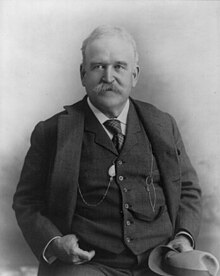John Davis Long | |
|---|---|
 | |
| Chair of the Massachusetts Republican Party | |
| In office 1902–1903 | |
| Preceded by | A. H. Goetting |
| Succeeded by | Thomas Talbot |
| 34th United States Secretary of the Navy | |
| In office March 6, 1897 – April 30, 1902 | |
| President | William McKinley Theodore Roosevelt |
| Preceded by | Hilary A. Herbert |
| Succeeded by | William Moody |
| 32nd Governor of Massachusetts | |
| In office January 8, 1880 – January 4, 1883 | |
| Lieutenant | Byron Weston |
| Preceded by | Thomas Talbot |
| Succeeded by | Benjamin Butler |
| Member of the U.S. House of Representatives from Massachusetts's 2nd district | |
| In office March 4, 1883 – March 3, 1889 | |
| Preceded by | Benjamin W. Harris |
| Succeeded by | Elijah A. Morse |
| 31st Lieutenant Governor of Massachusetts | |
| In office January 2, 1879 – January 8, 1880 | |
| Governor | Thomas Talbot |
| Preceded by | Horatio G. Knight |
| Succeeded by | Byron Weston |
| Speaker of the Massachusetts House of Representatives | |
| In office 1876–1878 | |
| Preceded by | John E. Sanford |
| Succeeded by | Levi C. Wade |
| Personal details | |
| Born | October 27, 1838 Buckfield, Maine, U.S. |
| Died | August 28, 1915 (aged 76) Hingham, Massachusetts, U.S. |
| Political party | Republican |
| Spouse(s) |
Mary Glover
(m. 1869; died 1882)Agnes Pierce |
| Children | 3 |
| Education | Harvard University (BA, LLB) |
| Signature | |
John Davis Long (October 27, 1838 – August 28, 1915) was an American lawyer, politician, and writer from Massachusetts. He was the 32nd governor of Massachusetts, serving from 1880 to 1883. He later served as the Secretary of the Navy from 1897 to 1902, a period that included the primarily naval Spanish–American War.
Born in Buckfield, Maine, Long was educated as a lawyer at Harvard University, later settling in Hingham, Massachusetts. He became active in Republican Party politics in the 1870s, winning election for the state legislature in 1874. He rose rapidly in prominence, and was elected lieutenant governor in 1879 and governor in 1880. He advocated modest reforms during his three years as governor, which were relatively uneventful.
After returning to private practice he was offered a cabinet post by his friend, President William McKinley, in 1896. He chose to become Secretary of the Navy despite lacking detailed knowledge of naval matters. He clashed with his Under-Secretary, Theodore Roosevelt, over expansion of the Navy when the Spanish–American War broke out in 1898. He resigned the post after Roosevelt became president, and resumed his law practice. He died at his home in 1915; his publications include a lifelong journal, a history of the Spanish–American War, and a verse translation of Virgil's Aeneid.